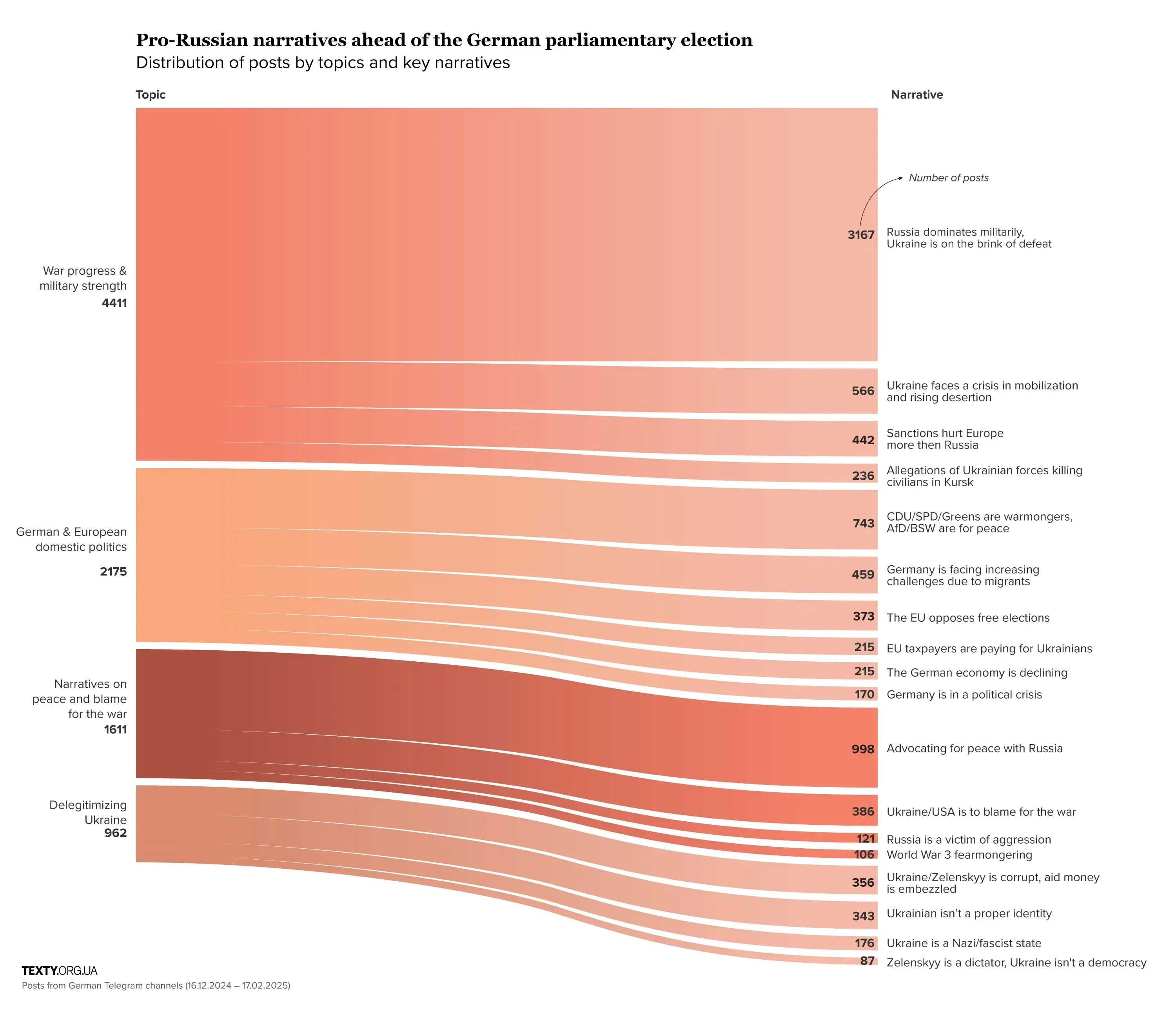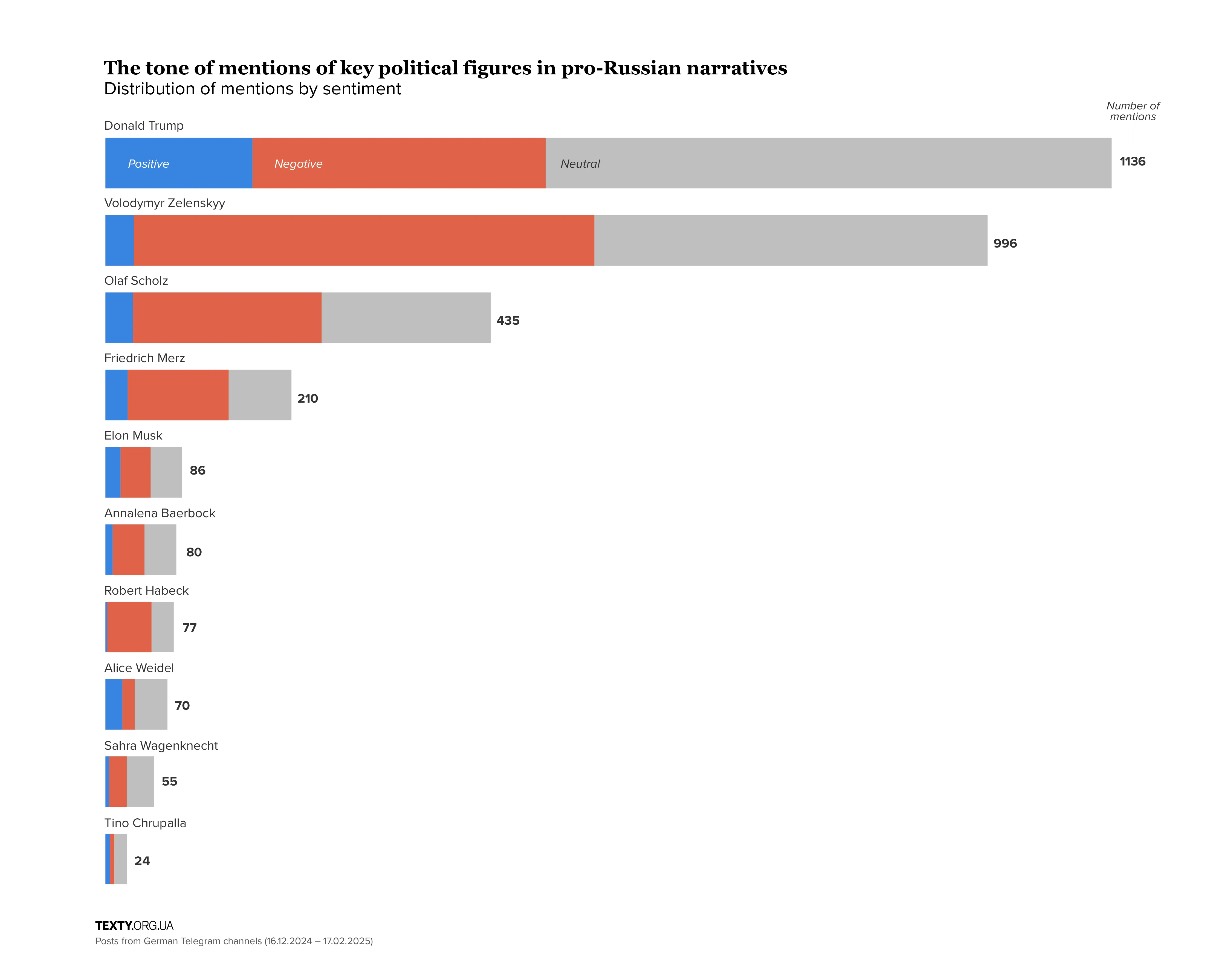What pro-Russian Telegram channels are sharing ahead of the German parliamentary election
On February 23, parliamentary elections will be held in Germany. Parties are competing for voter support, and key issues, including the Russian invasion of Ukraine and its consequences, are being actively discussed in the public space.
Читати українською / Lesen Sie diesen Artikel auf Deutsch
Currently, Telegram channels, bypassing the regulatory constraints of traditional media, have become platforms for spreading "alternative" news and pro-Russian narratives that are influencing socio-political discourse.
Together with OSINT for Ukraine (OFU), we examined a hundred of the most popular German Telegram channels, both in Russian and in German, which belong to two main categories: some are aimed at the Russian-speaking community, while others target German-speaking citizens.
We identified 18 recurring narratives related to the Russian invasion of Ukraine and grouped them into four categories.
- War progress & military strength
- Narratives on peace and blame for the war
- Delegitimizing Ukraine
- German & European domestic politics

Let's take a closer look at what is being written in each category.
War progress & military strength
The most popular topics in this category are:
- Russia dominates militarily, Ukraine is on the brink of defeat
- Ukraine faces a crisis in mobilization and rising desertion
- Sanctions hit Europe harder than Russia
- Allegations of Ukrainian forces killing civilians in Kursk.
This category has the highest number of posts among the Telegram channels studied. One of the most prolific narratives is the claim that Russia's victory and Ukraine's defeat are inevitable, supported by over 3,000 posts.
These narratives play several roles. When spread in Russian language channels, they can be seen as a form of nationalist sentiment aimed at evoking pride in Russia.
In German language groups, the posts suggest the futility of Ukraine’s resistance, which in turn supports the idea that continued financial and military support for Ukraine from Europe is pointless. This rhetoric is reinforced by posts claiming that the Russian economy is in better shape than before the war, despite Western sanctions.
Descriptions of alleged Ukrainian atrocities against Russian civilians in Kursk serve to legitimize Russia's aggression and help its supporters believe in the righteousness of its actions.
Another popular topic is Ukraine’s problems with mobilization and desertion, along with the assumption that Ukrainians do not want to fight. This is fueled by a large number of "busification" videos depicting military enlistment tactics that have been described as hurried, pressurised and problematic. These videos can be either real, partially real (taken out of context), or completely fabricated. We didn’t have the opportunity to investigate them in detail.
Narratives on peace and blame for the war
The most popular topics here include:
- Advocating for peace with Russia
- Ukraine/USA is to blame for the war
- Russia is a victim of aggression
- World War 3 fearmongering
This category includes narratives that, on the one hand, promote the idea of peace with Russia at any cost, implying that the world stands otherwise on the brink of World War III, and on the other hand, place the blame for the start of the war on the West.
Nearly 1,000 posts are dedicated to the theme of "peace at any cost," and about 100 claim that rejecting such an approach will inevitably lead to a world war. These narratives are especially actively spread on a German language channel with the manipulative name "Bürgerinitiative für Frieden" ("Citizens' Initiative for Peace"), which mostly shares videos of Russian forces fighting against the "Kyiv regime."
Delegitimizing Ukraine
The most popular topics in this category are:
- Ukraine/Zelenskyy is corrupt, aid money is embezzled
- Ukrainian isn’t a proper identity
- Ukraine is a Nazi/fascist state
- Zelenskyy is a dictator, Ukraine isn't a democracy
These narratives question Ukrainian national identity, the democracy of the state and its president, and portray Ukraine as a hopelessly corrupt country allegedly controlled by outright neo-Nazis.
343 posts — mostly in Russian language groups — challenge the very idea of the Ukrainian nation’s existence. They either claim that Ukrainians and Russians are one people or promote the idea that Ukrainian identity is inherently fascist. Such narratives are less common in German language channels, likely because their blatant imperial rhetoric contradicts the notion of "Russia is merely defending itself against the West."
For German language political channels, focusing on corruption in Ukraine serves as a convenient tool for criticizing their own government, which, they claim, spends citizens' taxes that end up in the pockets of Ukrainian officials. For example:
«Everyone in Ukraine knows how so-called politicians and oligarchs can buy the results they need (polls), as the country is riddled with corruption. Especially after 90% of Ukrainian 'media,' 'influencers,' and institutions lost funding from USAID.»
German & European domestic politics
The most popular topics in this category are:
- CDU/SPD/Greens are warmongers, AfD/BSW are for peace
- Germany is facing increasing challenges due to migrants.
- The EU opposes free elections. Romania is given as an example, and fears are being raised that the EU will cancel elections in Germany if the AfD wins.
- EU taxpayers are funding Ukrainians and Ukraine
- The German economy is declining
- Germany is in a political crisis
These narratives create a sense of crisis and dissatisfaction with Germany and EU policies, painting a negative image of the current government supporting Ukraine: «What do the CDU and 'old parties' stand for? Illegal mass migration for social benefits, inflation and money printing, the 'Green Deal' and unchecked nepotism, side effects from vaccination with no treatment options, the ban on cash payments, (...) and reparations payments to Ukraine.»
A lot of false information is being spread about rising poverty, inflation, the cost of living, the housing crisis, economic decline, and Germany losing its position of leadership. Special attention is given in the media to crime stories involving migrants, with each case being detailed if the suspects are of foreign origin. They emphasize that the social system favors refugees over German citizens:
«Refugees are given priority over German patients at the dentist. It's not enough that recipients of Bürgergeld – for example, from Ukraine – receive full dental treatment at the expense of taxpayers, while we finance them with our own labor. No, on top of all this, we also have to put up with longer waiting times.»
Political parties in Germany are divided into "bad" and "good": the CDU, SPD, and the Greens are portrayed as those who fuel the war, while the AfD and BSW are presented as peace parties. The upcoming elections are described as crucial: according to these channels, their outcome will determine whether there will be war or peace in the world. Fear is being stirred that if the "peace party" (AfD) wins, the EU will cancel the election results, as allegedly happened in Romania.
Personalities
We also analyzed the tone of mentions of 10 political figures most commonly linked to Ukraine and Germany, in order to evaluate the balance between positive and negative coverage of each.

The results were quite unexpected — with the exception of AfD politicians Alice Weidel and Tino Chrupalla, all other figures are mostly mentioned in a negative context. At the same time, the ratio of positive to negative mentions varies significantly among different politicians.
Specifically, Volodymyr Zelenskyy, CDU leader Friedrich Merz, German Foreign Minister Annalena Baerbock, and Vice Chancellor Robert Habeck are almost exclusively mentioned in a negative light. In contrast, for every two negative mentions of Donald Trump, there is one positive mention — the same statistics apply to Elon Musk.
Methodology
We collected data for the study from December 16, 2024 (the day the early elections for the German Bundestag were announced) to February 17, 2025. In total, we analyzed 99,000 posts in German and Russian from 94 channels.
The list of 39 channels focused on Russians living in Germany or known for spreading Russian propaganda was provided by the OFU team. The remaining 55 channels were selected using the analytical service Telemetr.io as the most popular in terms of subscribers in Germany in the categories of "News & Media" and "Politics."
For each post, we applied the automatic topic modeling algorithm, BERTopic. The identified topics (groups of content with similar themes) were manually analyzed for the presence of defined narratives. As a result, we found over 9,000 posts promoting such narratives.
Within these posts, we searched for mentions of individuals provided by the OFU team. To classify the sentiment (tone) regarding the mentioned figures, we used API requests to the OpenAI o3-mini model.
If you find this material useful, support the Texty.org.ua team. You can do this here: https://texty.org.ua/p/support_en/
Texty.org.ua is also open to collaboration with donors, research organizations, and other interested parties regarding the analysis of pro-Russian narratives across different social media platforms ahead of elections in European countries. The results of the analysis can be both open and confidential.

